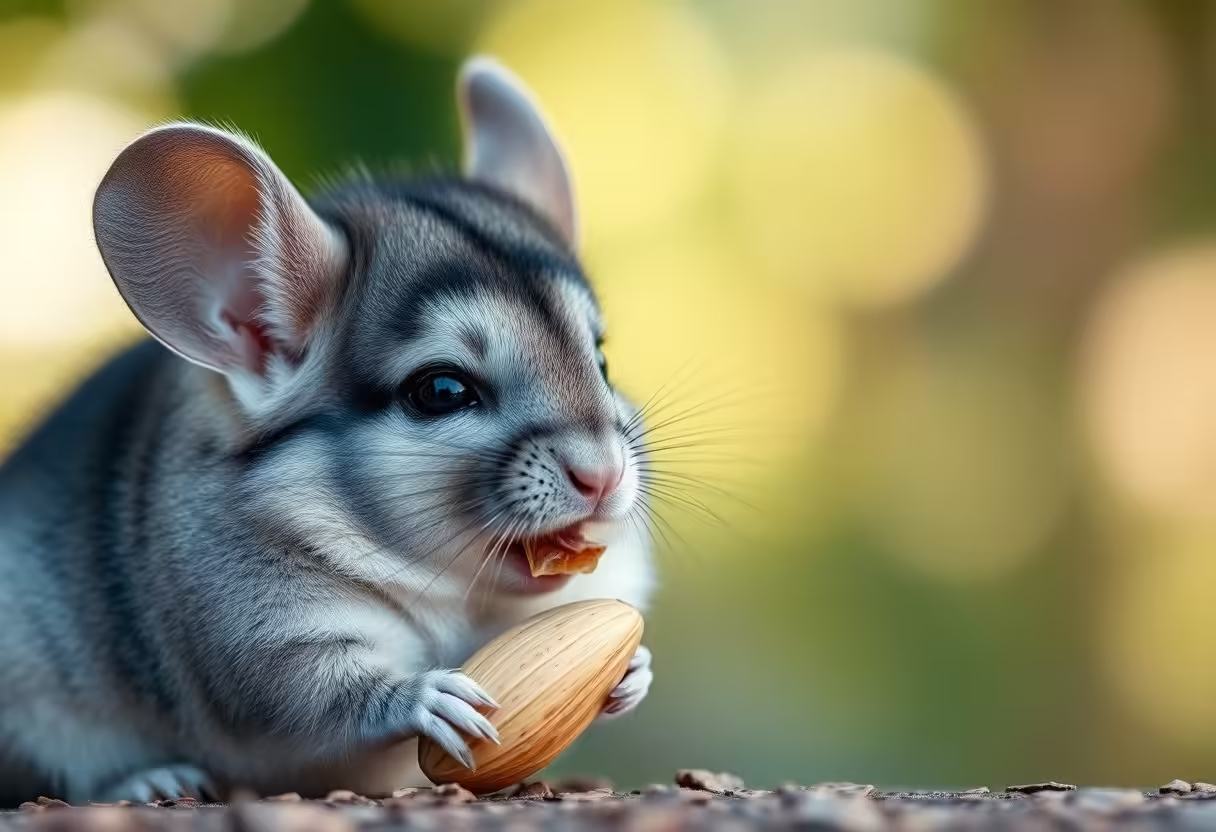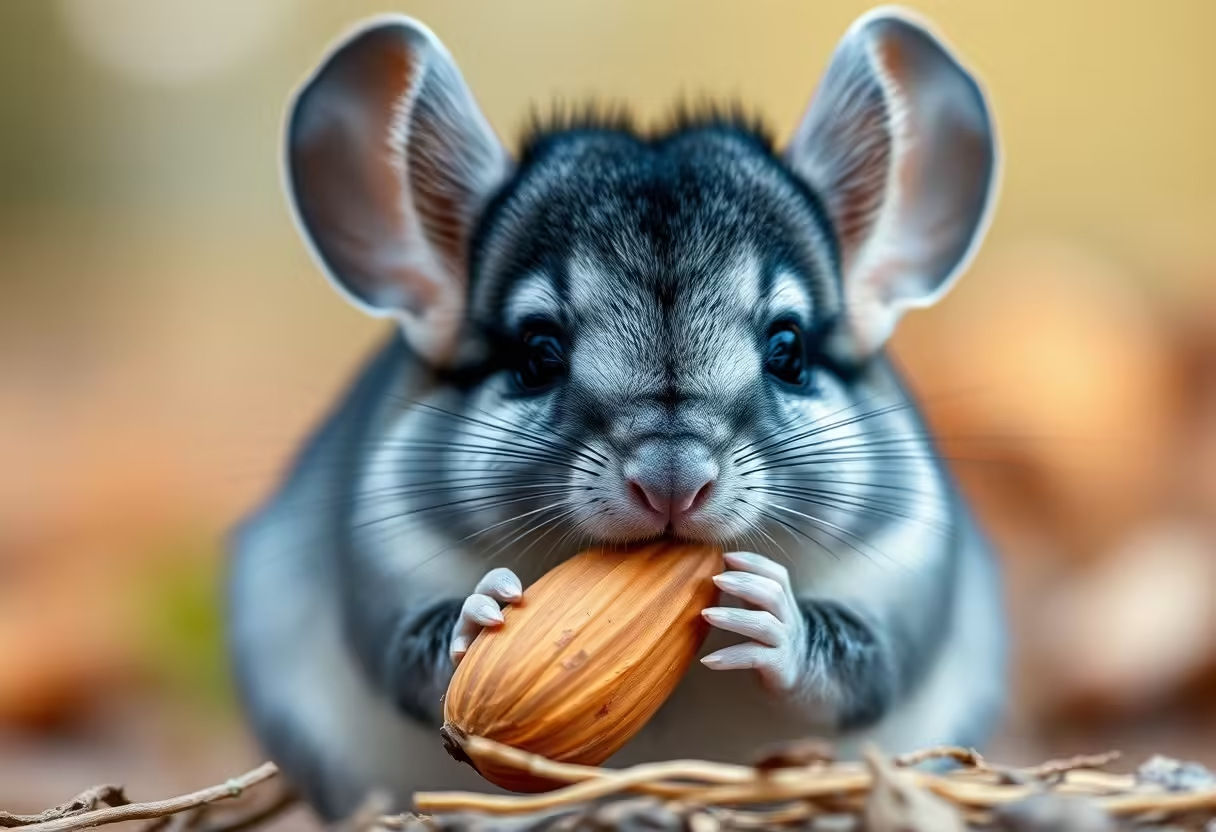As a responsible chinchilla owner, you’re likely curious about what treats are safe for your furry friend to enjoy. Almonds, in particular, may seem like a healthy and tasty option, but it’s necessary to understand their potential impact on your chinchilla’s health. While almonds aren’t toxic to chinchillas, they can still cause harm if fed excessively. In this article, we’ll probe into the pros and cons of feeding almonds to your chinchilla, helping you make an informed decision about what treats to provide.

Key Takeaways:
- Fatty Acids: Chinchillas should not eat almonds as they are high in fatty acids, which can cause digestive issues and obesity in these small animals.
- Choking Hazard: Almonds are a potential choking hazard for chinchillas, especially if they are not chopped or sliced into small pieces. Their small size and tendency to swallow food whole can lead to blockages or respiratory problems.
- Nutrient Imbalance: Almonds do not provide the necessary nutrients for a balanced chinchilla diet. They are low in fiber and high in calories, which can lead to nutrient deficiencies and health problems if fed as a regular part of their diet.
Nutritional Value of Almonds
The nutritional profile of almonds is quite impressive, making them a popular snack among humans. But before we examine whether they’re suitable for your chinchilla, let’s take a closer look at what they bring to the table.
Protein Content
For a small nut, almonds pack a decent amount of protein. A 1-ounce serving (about 23 almonds) contains around 6 grams of protein. While this may not seem like a lot, it’s still a significant contribution to your chinchilla’s daily protein needs.
Fat and Carbohydrate Composition
Composition-wise, almonds are primarily made up of fat, with a small amount of carbohydrates. Specifically, a 1-ounce serving contains around 14 grams of fat and 6 grams of carbohydrates.
Another important aspect of almond composition is their high levels of unsaturated fats, which can be beneficial for heart health in humans. However, for your chinchilla, it’s necessary to note that their digestive system is designed to process high amounts of fiber and low amounts of fat. Feeding them almonds regularly could lead to an imbalance of fatty acids and potentially cause digestive issues. On the other hand, the fiber content in almonds is relatively low, which might not provide the same benefits for your chinchilla as it would for you.
Chinchillas’ Dietary Needs
Assuming you’re considering adding almonds to your chinchilla’s diet, it’s crucial to understand their unique nutritional requirements. Chinchillas have specific dietary needs that are crucial for their overall health and well-being.
High-Fiber Requirements
For optimal digestive health, chinchillas require a high-fiber diet consisting of hay, grass, and plant-based foods. Fiber helps maintain a healthy gut and prevents digestive issues.
Sensitive Digestive System
Any changes to your chinchilla’s diet can be challenging for their sensitive digestive system. Even small amounts of new foods can cause stomach upset, diarrhea, or other health problems.
To ensure your chinchilla’s digestive system remains healthy, it’s crucial to introduce new foods gradually and in limited quantities. Monitor your chinchilla’s behavior and stool quality closely, as signs of digestive distress can appear quickly. Avoid sudden changes to their diet, and consult with a veterinarian if you notice any adverse reactions. By doing so, you can help prevent serious health complications and ensure your chinchilla leads a happy and healthy life.
Can Chinchillas Eat Almonds?
Keep in mind that while almonds may seem like a healthy snack for your chinchilla, they can be problematic if fed in excess or without proper preparation. Almonds are high in fat and calories, which can lead to weight gain and other health issues in chinchillas.
Potential Health Risks
On the other hand, almonds can also pose some serious health risks to your chinchilla if not fed correctly. The high fat content in almonds can cause gastrointestinal problems, such as diarrhea and bloating, which can be uncomfortable and even life-threatening for your pet.
Safe Feeding Guidelines
Chinchillas can safely eat almonds in moderation, but it’s crucial to follow some guidelines to avoid any potential health risks. You should only offer almonds as an occasional treat, and in limited quantities, making sure they don’t make up more than 10% of your chinchilla’s daily diet.
Understanding the importance of proper portion control is crucial when feeding almonds to your chinchilla. A good rule of thumb is to limit almond intake to 1-2 nuts per pound of body weight per week. This will help prevent overfeeding and minimize the risk of health problems. By following these guidelines, you can provide your chinchilla with a tasty and nutritious treat while keeping them safe and healthy.
Alternative Treats for Chinchillas
Despite almonds being off-limits, there are plenty of other treats you can offer your chinchilla. In fact, providing a varied and nutritious diet is vital for their overall health and well-being. By introducing new foods gradually and in moderation, you can ensure your chinchilla stays happy and healthy.
Healthy Snack Options
Chinchilla owners often overlook the importance of hay in their pet’s diet. Hay is an excellent snack option, as it helps keep their teeth trimmed and digestive system functioning properly. Look for high-quality timothy hay or alfalfa hay, and offer it in limited quantities daily.
Fresh Fruits and Vegetables
Healthy fruits and veggies can be a wonderful addition to your chinchilla’s diet. However, it’s crucial to introduce them gradually and in moderation to prevent digestive upset.
It’s vital to remember that fresh produce should not exceed 10% of your chinchilla’s daily diet. Some safe options include leafy greens like kale and spinach, as well as fruits like strawberries and blueberries. Avoid giving your chinchilla high-sugar fruits like bananas and grapes, as they can cause health problems. Always wash the fruits and veggies thoroughly before offering them to your pet.
Precautions and Considerations
Once again, it’s important to remember that almonds should be treated as an occasional snack for your chinchilla, not a staple in their diet. While they can be a healthy addition, there are potential risks to consider.
Allergic Reactions
The introduction of almonds into your chinchilla’s diet can trigger allergic reactions, which may manifest as skin irritation, itching, or digestive issues. Monitor your pet’s behavior and health closely after feeding them almonds for the first time.
Overfeeding and Obesity
One of the most significant concerns when feeding your chinchilla almonds is the risk of overfeeding and obesity. Chinchillas have a sensitive metabolism, and excessive calorie intake can lead to severe health problems.
With this in mind, it’s crucial to limit the amount of almonds you feed your chinchilla to avoid overfeeding. A good rule of thumb is to start with small amounts (about 1-2 almonds per pound of body weight per week) and monitor your pet’s weight and overall health. Bear in mind, it’s always better to err on the side of caution and prioritize your chinchilla’s health over their desire for treats.
Owner Experiences and Testimonials
Unlike what you might expect, many chinchilla owners have had varying experiences when it comes to feeding their pets almonds. While some have reported no issues, others have encountered problems that have left them wondering if almonds are safe for their furry friends.
Success Stories
Testimonials from some chinchilla owners suggest that their pets have been able to enjoy almonds as an occasional treat without any adverse effects. Some owners have even reported that almonds have helped to support their chinchilla’s dental health. However, it’s important to note that these owners have been careful to introduce almonds slowly and in moderation.
Lessons Learned
On the other hand, some owners have learned the hard way that almonds can be problematic for their chinchillas. Stories of digestive issues, allergies, and even respiratory problems have surfaced, serving as a cautionary tale for those considering adding almonds to their chinchilla’s diet.
Stories of chinchillas experiencing digestive issues, such as diarrhea or bloating, after consuming almonds are a stark reminder of the importance of responsible feeding practices. Additionally, some owners have reported that their chinchillas have developed allergies to almonds, leading to skin problems and other issues. In extreme cases, respiratory problems have even occurred, highlighting the potential dangers of feeding almonds to your chinchilla. It’s crucial to prioritize your pet’s health and safety above all else.
Conclusion
Taking this into account, it’s clear that almonds are not a suitable snack for your chinchilla. While they may seem like a healthy treat, the high fat and protein content can cause digestive issues and other health problems in these small animals. As a responsible chinchilla owner, it’s important to prioritize your pet’s health and stick to a balanced diet specifically formulated for their needs. By doing so, you’ll ensure your chinchilla lives a happy and healthy life.
FAQ
Q: Can chinchillas eat almonds as a regular snack?
A: No, it’s not recommended to feed almonds to chinchillas as a regular snack. Almonds are high in fat and can cause digestive issues in chinchillas, such as diarrhea and bloating.
Q: Are almonds toxic to chinchillas?
A: Almonds themselves are not toxic to chinchillas, but they can cause problems if fed in excess. However, it’s important to note that almonds can be contaminated with aflatoxins, which are toxic to chinchillas. Aflatoxins are produced by a type of mold that can grow on nuts, including almonds.
Q: Can I give my chinchilla a single almond as an occasional treat?
A: While it’s not recommended to feed almonds regularly, a single almond as an occasional treat is unlikely to cause harm. However, it’s important to ensure that the almond is fresh, unsalted, and unsweetened. Remove any shells or skins, as they can cause intestinal blockages.
Q: What are some healthy alternative snacks for my chinchilla?
A: Chinchillas require a diet rich in fiber and low in fat. Healthy snack options include hay, dried fruit (such as cranberries or apricots), and limited amounts of fresh vegetables like leafy greens, carrots, and sweet potatoes.
Q: How can I ensure my chinchilla is getting a balanced diet?
A: To ensure your chinchilla is getting a balanced diet, provide a high-quality commercial chinchilla food as the main staple, supplemented with hay and limited amounts of fresh vegetables and fruits.
